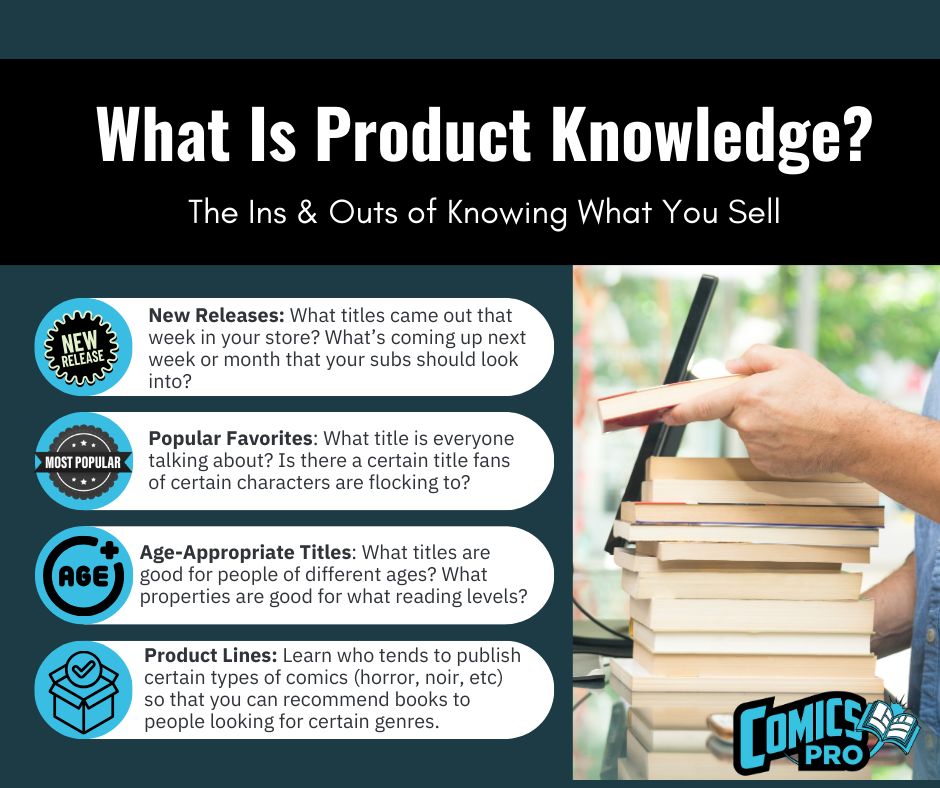Associate Resources
- Cash Handling
- Customer Service as a Prevention
- Stocking Vs Filling
- Product Placement
- Creating Great Displays
- How to be a Net Producer
- Renting Vs Owning Your Job
HANDSELLING 101: KNOW YOUR PRODUCT
What is “The Product Strategy” of Handselling?
The Product Strategy of handselling is a sales technique built from the salesperson’s knowledge of their product. The Product Strategy is straight-to-the-point and easier to use with customers who are in a hurry or may, initially, seem uninterested in talking (in other words, may not be as open to the Social Strategy of Handselling).
Important Forms of Product Knowledge
Getting to know your product, especially in an expansive field like comics, is a long-term project–and you’ll never know everything. Here are some major “categories” of product you should familiarize yourself with:
| New Releases | Many people are coming in for the weekly new releases. Take a moment every week to check on what titles have just been published, and what will be published soon. |
| Popular Favorites | Familiarize yourself with award-winning books and books that are frequently discussed by comics fans. Pay attention to the broader fan discussions of titles (at cons, online, etc), and also to what is specifically popular with your local community. |
| Age-Appropriate Titles | Know what books are appropriate for certain age groups and reading levels. Learn how to quickly determine audience and age level even if you are not familiar with the contents. |
| Product Lines | Familiarize yourself with certain publishers and imprints. For example, Vault Comics focus on horror, sci-fi, and fantasy comics. This can help you identify a book’s content and intended audience even if you are not familiar with the story. |
Where Do I Get This Information?
There is simply no way you will be able to read every single book that comes into your store. That’s why it’s important to know where you can find information about books, even if you haven’t read them yet. Here are some sources you should turn to:
- Your Fellow Staff. Read any “staff recommendation” cards or posts folks make. If you have more questions, talk with them! Telling a customer, “[Insert name here] has been raving about this book!” still feels like an honest, genuine recommendation.
- Solicits. Flip through Previews, other preview catalogs, and marketing emails. These marketing materials will generally provide brief plot synopsis and comp titles (see below).
- Customers. You can turn a conversation with a customer into a covert fact-finding mission. If someone brings up a book they like, ask what they are enjoying about the book.
- Reviews & Discussion. Do you have a favorite reviewer on Tiktok or Youtube? Or do you read a newsletter or a blog that recommends and reviews comics? These kinds of resources can be helpful for expanding your knowledge about books you haven’t been exposed to yet.
Comp Titles
Marketing material for new books will often advertise a new book by including multimedia comp titles (comparative titles) like: “This book is like X-Men met Breakfast Club!” One of the most common ways you will use product knowledge to handsell books is by taking advantage of comp titles like these. Comp titles are especially useful when a customer wants to read something new, but isn’t sure what to read yet. They are also useful when you don’t have the exact book a customer is looking for but think they might like another similar book.
Here are some important things to consider when suggesting comp titles for a customer:
- Never be afraid to ask about other media, especially if a customer is new to comics. If a customer can’t think of a comic they like, ask them about their favorite movies, TV, video games, novels, etc.
- Who is the author or artist of the work a customer mentions? Is there other work available by those creators, or frequent collaborators of those creators?
- For example, a customer may say they are big fans of Doctor Who. You could let them know that Paul Cornell and Neil Gaiman wrote for Doctor Who and also have written their own comics. Jody Houser and Dan Slott haven’t written for the TV show, but have written many Doctor Who comics, as well as a whole lot more!
- What does the customer like about the work they mention? Is it the visual style, the writing style, the genre, or the theme? What don’t they like?
- For example, a customer says their favorite TV show is Bones. They might like murder mysteries like The Good Asian. They might care more about the found family aspect, and prefer something like Runaways. Or, they could be interested in stories about autistic characters, and therefore might enjoy a memoir like Invisible Differences. The only way to find out what a customer really wants is to ask!


